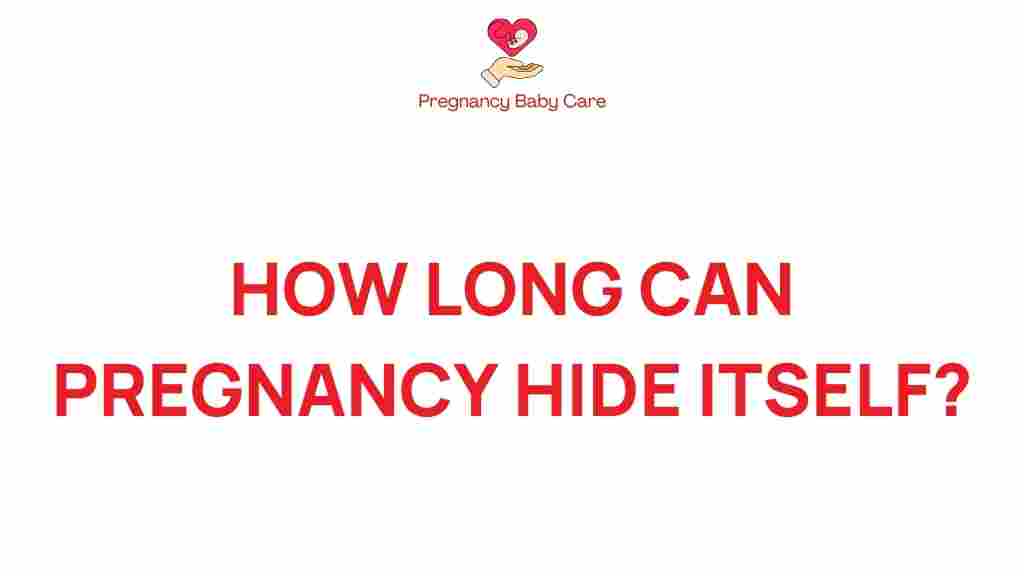The Hidden Secrets of Pregnancy: How Long Can It Remain Undetected?
Pregnancy is an extraordinary journey, but it can also be a time of uncertainty and confusion, especially in its early stages. Many women wonder about the detection of pregnancy and how long it can remain concealed before showing clear signs. Understanding the early signs of pregnancy and the timeline of symptoms can significantly enhance awareness, leading to better health outcomes for both mother and baby. In this article, we will delve into the hidden secrets of pregnancy detection, explore the timeline of symptoms, and provide valuable insights to help you identify whether you might be pregnant.
Understanding Pregnancy Detection
Pregnancy detection typically begins with the onset of certain symptoms and can be confirmed through various methods. It’s essential to recognize that the body undergoes numerous changes during this period, and not all women experience the same symptoms.
Common Early Signs of Pregnancy
While some signs may vary, many women experience common early signs of pregnancy. Here’s a list of symptoms that may indicate you are pregnant:
- Missed Period: One of the first signs of pregnancy is a missed menstrual cycle.
- Nausea: Often referred to as morning sickness, this can occur at any time of the day.
- Breast Changes: Tenderness, swelling, or changes in the areola may be noticeable.
- Fatigue: Increased tiredness is common due to hormonal changes.
- Frequent Urination: As the uterus expands, it may press on the bladder.
- Food Cravings or Aversions: Changes in taste preferences can occur.
- Mood Swings: Hormones can affect emotional stability.
- Light Spotting: Known as implantation bleeding, it can occur when the fertilized egg attaches to the uterine lining.
The Pregnancy Timeline
The timeline of pregnancy detection varies from woman to woman. Typically, the earliest signs can be noticeable within a few weeks after conception. Here’s a breakdown of the general timeline:
- 1-2 Weeks Post-Conception: Some women may notice very early signs, although it is not common.
- 3-4 Weeks: This is when a missed period might occur, prompting many to take a pregnancy test.
- 5-6 Weeks: Symptoms like nausea, fatigue, and breast tenderness often become more pronounced.
- 7-8 Weeks: By this time, most women confirm their pregnancy, either through home tests or doctor visits.
How Long Can Pregnancy Remain Undetected?
Pregnancy can remain undetected for various reasons. Some women may not experience noticeable symptoms, while others may mistake early signs for premenstrual syndrome (PMS). Here are some factors that contribute to pregnancy going undetected:
- Irregular Menstrual Cycles: Women with irregular periods may not notice a missed cycle.
- Subtle Symptoms: Some may experience very mild symptoms that are easily overlooked.
- Health Conditions: Certain health issues can mask pregnancy symptoms.
Testing for Pregnancy
To confirm a pregnancy, various tests can be conducted. These tests work by detecting the hormone hCG (human chorionic gonadotropin) in the body. Here are the most common methods of detection:
- Home Pregnancy Tests: These tests can be taken at home and are widely available. They are most effective when taken after a missed period.
- Blood Tests: A healthcare provider can conduct a blood test to detect hCG levels, providing a more accurate result than home tests.
- Ultrasound: An ultrasound can confirm a pregnancy and determine how far along you are.
Health Considerations During Early Pregnancy
It’s crucial to prioritize your health during early pregnancy. Here are some health tips to consider:
- Nutrition: Focus on a balanced diet rich in vitamins and minerals.
- Hydration: Stay well-hydrated to support overall health.
- Avoid Harmful Substances: Stay away from alcohol, smoking, and illegal drugs.
- Regular Check-ups: Schedule regular appointments with your healthcare provider.
Troubleshooting Tips for Undetected Pregnancy
If you suspect you may be pregnant but are not experiencing clear symptoms, here are some steps to consider:
- Take a Pregnancy Test: Use a home pregnancy test for initial detection.
- Track Your Cycle: Keep a detailed record of your menstrual cycle and symptoms.
- Consult a Healthcare Provider: If you have concerns about your symptoms or lack thereof, seek professional advice.
For more detailed information about pregnancy health and awareness, consider visiting resources like the Office on Women’s Health.
Conclusion
Understanding how long pregnancy can remain undetected is crucial for every woman. Being aware of the early signs of pregnancy and the timeline of symptoms can empower women to seek the necessary medical advice and support. If you suspect you might be pregnant, don’t hesitate to take action by conducting a test or consulting with a healthcare professional.
By increasing your awareness about pregnancy and its symptoms, you can ensure better health for yourself and your future child. Remember, each pregnancy is unique, and staying informed is the best way to navigate this miraculous journey.
This article is in the category Pregnancy and created by PregnancyBabyCare Team
